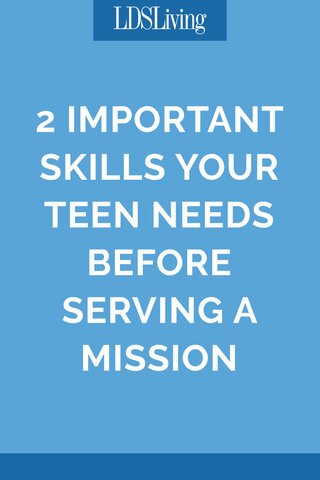The following is an excerpt from Missionary Possible: Preparation Tips from New Testament Heroes by Eric Rigby.
In just a couple verses in the book of Acts, Paul and his missionary companion, Barnabas, travel hundreds of miles and preach in different synagogues. Can you imagine the frustration on Paul’s mother’s face when she received his weekly letters?
“Dear Mom,
Baptized all the Gentiles at Antioch in Pisidia. On to Iconium next. Please send more black socks and a new walking stick.
Love Paul”
In about Paul’s third transfer, he and Barnabas travel to the city Iconium, where they have both success and opposition. The opposition side is made up of angry citizens who don’t want to hear the gospel message, and they drive the missionaries from Iconium. Paul and Barnabas escape to the city Lystra, where they meet a crippled man, much like the man Peter and John healed at the gates of the temple.
Paul gives the man a blessing, and the man is able to stand for the first time. However, any cause for celebration is put on hold because the people watching this miracle proclaim that Paul and Barnabas are more than men. In fact, they say, “The gods are come down to us in the likeness of men” (Acts 14:11)
Think about this for a moment: You are called as a missionary for the Church. Your goal is to progress God’s work, but you are certainly not God. Paul and Barnabas know it’s wrong to steal Heavenly Father’s credit; it wasn’t their priesthood that healed the crippled man. They are so upset by the idea of receiving the acclaim for the miracle that they rent their clothes. This doesn’t mean they open up a line of clothing stores and rent out their sashes and cloaks to tourists; renting their clothes actually means tearing their apparel because they’re so appalled.
The missionaries then explain, “We also are men of like passions with you, and preach unto you that ye should turn from these vanities unto the living God, which made heaven, and earth, and the sea, and all things that are therein” (Acts 14:15).
I love what Paul says in that verse, because it correlates exactly with how young men and young women can prepare today for a mission by keeping passions and desires in check.

1) Self Control
To become focused on a mission now, your teen needs to learn about self-control. As a missionary, they won’t be able to go to the movies, watch TV, play sports all the time, text friends, hang out, or just be lazy. If they already don’t do any of those things, congratulations. They are much better prepared than I was. But if they’re like lots of teenagers who enjoy an hour of TV after a long day at school, remind them that they won’t have that in the mission field. They will have the work they are called to do, and it’s much more satisfying than TV.
It might be worthwhile to note the things they regularly do. If you notice any of your teen's hobbies or pastimes getting in the way of their mission preparation, consider how you can help subtract those items from their list. In a general conference priesthood session, Elder Quentin L. Cook explained to the men and boys of the Church the danger of making excuses and looking for too many distractions in life. “Distractions and rationalizations that limit progress are harmful enough, but when they diminish faith in Jesus Christ and His Church, they are tragic.”
2) Productive Planning
But helping them remove time-consuming activities from their routine isn’t enough. They need to fill that void with something productive. You can’t just say, “No more watching this certain TV show at 5:30” and be done with it. Now they'll need to think of something else to do from 5:30 to 6:00.
Your teen might not be used to having a set schedule, but they will learn to use a schedule constantly as a missionary. Filling those gaps in their schedule now with productive things can help them learn how to plan.
As a missionary, every day will be full, even the days that aren’t. Allow me to explain: Missionaries carry around daily planners, whether they are a hard paper copy or an electronic device. Every night before they go to bed, they fill in lessons to teach and places to be for the next day. They arrange their schedules so that they can fit in the most worthwhile activities. But even if there are days without many people to teach or prior engagements, it doesn’t mean it's a day off. Even preparation days, or P-days, are not days off from missionary work. Instead, empty calendar days just mean a full day ahead for finding new people to teach. Because missionaries need to always be focused on the work, it’s a good idea for your teen to learn to focus now by using a calendar to plan out simple things.
Planning out days as a junior high or high school student can seem tough because their days are already mostly made up for them with school. But they can still schedule in what time they will do homework when they get home. This can be a big help, because if they know that from 3:30 to 4:30 they're doing math homework, you won’t get to 10:00 p.m. and find them frantically searching for the calculator to finish an assignment.
Scheduling things is the same as planning, and making plans is important for anyone to be successful, especially missionaries. So help your teen start now to use their time wisely and prepare for mission life!
For more great tips for teens on mission preparation, check out Missionary Possible: Preparation Tips from New Testament Heroes by Eric Rigby.
Have a teen getting ready to go on a mission? This book is the perfect way to combine scripture study with practical application in a way that is easy for teens to read, understand, and apply! They'll learn valuable skills, like how to recognize the Spirit and why obedience is so important, by reading about the lives and experiences of New Testament Heroes like Paul, Peter, and John. Click here to purchase a copy for your teen.






